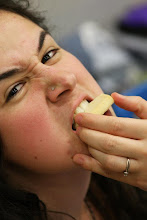A friend with severe food sensitivities recently mentioned how difficult it was for her to be a dinner guest. She can't have peanuts, almonds, caffeine, most cheeses, not even chocolate, and countless other delicious foods, many of which she loves because if she does, even in small amounts she ends up with horrible, multi-day migraine headaches. She is not "allergic" or morally opposed to eating these foods, nor is she just being picky, so what does she do to not offend her host/ess or get sick?
It is situations like these that make me wish for a more socially isolated and restricted time. A time when one knew only a few people and would always only know those few people so everyone had to be nice and play by the rules and everyone knew the rules. In a modern world, with the internet and facebook and ease of migration, how do we know what the rules are? Will turning down an offer seem rude or well manured? Will sending a graduation/birth/wedding announcement be seen as politely informative or present grubbing? The whole thing is stuck in a weird gray area.
Luckily for us, we have such great minds as Rabbi Hillel and Emanuel Kant; the so called golden rule - "Do on to others as you would have done to you," and it's lovely sisters, "Do not do to others that which you find repugnant" and the Categorical Imperative, "Act according to the maxim that you would have be universal law." You might be asking, what does a pre-modern biblical scholar and a deontological ethicist's idea on morality have to to do with etiquette. That's a good question. Without launching into a big full ethics debate, I will condense it down to this - etiquette is a social construction that gives us rules to follow and the best rules are ones that don't hurt or offend others. Since we are all people, the best we can do is to treat others the same as we would like to be treated (and part of that includes making sure we know what someone else thinks will be 'nice' if we want to be treated 'nicely').
Back to the dinner party problem, gusts and host/esses have certain social obligations to each other in order for each to be treated well.
If you're allergic or sensitive to certain foods/have ethical or religious food taboos, it is your duty as a guest to make that clear ahead of time to the host/ess and as a host/ess it is your duty to ask your guests if there are foods they can't or wont eat (for any reasons) ahead of time.
The big thing my in-laws knew about Judaism was that Jews don't eat pork, so they asked multiple times before I first ate dinner with them if I ate pork (I do, but gosh do I think ham is the nastiest edible meat I have ever tasted!). Since I simply do not particularly enjoy ham, but have no objection other than my own tastes to it, I think it would be rude to lead them to believe that I don't eat pork (bacon, sausage, etc are all delicious). If they serve me ham, I take the smallest serving and then dig in to the potatoes, bread, vedgies, casserole, and other side dishes. By eating a bit of the ham, which does not make me ill in any way, I keep from insulting my hosts (were I to refuse the ham, that would be rude). The trick is eating a bit, and letting them believe if they would like that you ate more of the offending food than you actually did. By letting your dislike slide, you keep from making anyone uncomfortable - I hate to feel like a bad hostess so why should I make my mother-in-law feel that way? This all goes out the window if the food will make you ill.
If a food will make you physically ill, or if you find eating the food morally/ethically questionable, or if you keep a religious taboo against eating the food, then as a guest you are under obligation to tell your host ahead of time. If the host serves the food (and this is only rude if there are no other foods served, if it is a few dishes out of many it is perfectly acceptable, the number of dishes that cater to a specific guest is a function of how weird the food restriction is and how many other guests there are, if you are vegan and have celiac disease, expect one dish that you can eat and be thankful, if you are a vegetarian who can't have olives or bacon, then expect more dishes) then as a guest you are expected to not mention it publicly and eat what you can without making a scene. If there is no food present which you can safely/ethically eat *and* you let the host know ahead of time, then you are in a bind - the polite thing to do is to be gracious and drink your water, going back to that making him/her feel uncomfortable and then perhaps speaking to the host privately.
Subscribe to:
Post Comments (Atom)

No comments:
Post a Comment